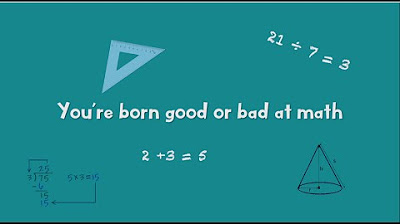You're Not Bad At Math, You're Just Lazy
Summary
TLDRIn this video, Trace and D News debunk the myth that people are either naturally good or bad at math. They emphasize that math is not genetic but a language that can be learned like any other, supported by scientific studies. The video encourages viewers to practice math regularly, highlighting its benefits for brain function and problem-solving skills.
Takeaways
- 🧠 The belief in a 'math gene' is a myth; math ability is not predetermined genetically.
- 🗣️ The phrase 'I'm not a math person' is harmful and should be abandoned as it can hinder one's own progress.
- 🎨 Math is not the enemy of creativity; it is used by artists like painters and sculptors to enhance their work.
- 📚 Math is a language, similar to spoken languages or music, which can be learned with exposure and practice.
- 🏠 Early emphasis on math at home can give a slight advantage, but it's never too late to learn and improve.
- 🏋️♂️ Like physical activities, math requires practice and with time, one can become proficient.
- 🧬 A study in the journal Neuroscience found a specific section of the brain for contemplating numbers, suggesting our brains are equipped for math.
- 🌐 Learning a second language and being bilingual have cognitive benefits, including improved problem-solving and delayed brain aging.
- 📈 Exposure to math makes students smarter by improving the functioning of the prefrontal cortex, which is associated with executive functioning.
- 🏫 In countries with longer school years, like Japan, students have more exposure to math, which can enhance their skills, not because of genetic superiority.
- 💡 The video encourages viewers to start practicing math, like mentally calculating tips, to improve their abilities over time.
Q & A
What is the main message of the video script about math?
-The main message is that there is no such thing as being bad at math due to genetics or innate ability. Instead, math is a skill that can be learned and improved with practice, similar to learning a language or playing a sport.
Why do some people feel they are not 'math people'?
-Some people feel they are not 'math people' because they have internalized the belief that mathematical ability is predetermined by genetics. This belief can be self-limiting and discourage effort in learning math.
What does the script suggest about the relationship between math and creativity?
-The script suggests that math is not the opposite of creativity. In fact, artists like painters and sculptors use math to create curves, depth, and ensure structural integrity in their work.
How does the script relate math to language learning?
-The script compares math to learning a language, emphasizing that just like in language classes, exposure and practice at home can give a head start, but it doesn't mean one cannot learn later in life.
What does the script say about the development of writing and mathematics?
-The script mentions that writing was developed around 5,000 years ago by the Sumerians, who also devised a way to write mathematics, indicating that math has a long history intertwined with written language.
According to the script, how does learning math at a younger age benefit an individual?
-Learning math at a younger age can provide a slight advantage, as it allows for more familiarity and comfort with the subject. However, the script emphasizes that it's never too late to learn and improve in math.
What does the script reveal about the brain's capacity for numbers?
-The script cites a study that found a specific section of the brain for contemplating numbers, suggesting that our brains are naturally equipped to work with numbers.
How does learning a second language relate to brain health according to the script?
-The script mentions that researchers at the University of Kentucky showed learning a second language can delay aging, keep the brain agile, and improve the ability to switch between tasks and solve problems.
What benefits does math exposure provide to the brain, as mentioned in the script?
-According to the script, exposure to math makes students smarter by improving the functioning of the prefrontal cortex, which is associated with executive functioning skills such as planning, organizing, strategizing, and managing time and space.
What does the script suggest about the impact of longer school years on math proficiency?
-The script uses Japan as an example to suggest that longer school years provide more exposure to math, which can improve proficiency, rather than indicating a genetic advantage in math ability.
What advice does the script give to those who want to improve their math skills?
-The script advises to start practicing math in everyday situations, such as mentally calculating tips, as consistent practice will lead to improvement over time.
Outlines

Esta sección está disponible solo para usuarios con suscripción. Por favor, mejora tu plan para acceder a esta parte.
Mejorar ahoraMindmap

Esta sección está disponible solo para usuarios con suscripción. Por favor, mejora tu plan para acceder a esta parte.
Mejorar ahoraKeywords

Esta sección está disponible solo para usuarios con suscripción. Por favor, mejora tu plan para acceder a esta parte.
Mejorar ahoraHighlights

Esta sección está disponible solo para usuarios con suscripción. Por favor, mejora tu plan para acceder a esta parte.
Mejorar ahoraTranscripts

Esta sección está disponible solo para usuarios con suscripción. Por favor, mejora tu plan para acceder a esta parte.
Mejorar ahoraVer Más Videos Relacionados
5.0 / 5 (0 votes)






